The Complete Guide to Game Design and Game Development in Malaysia
The global gaming industry is a billion-dollar business. Answer the demand and join this booming field with a Degree in Game Design and Development.
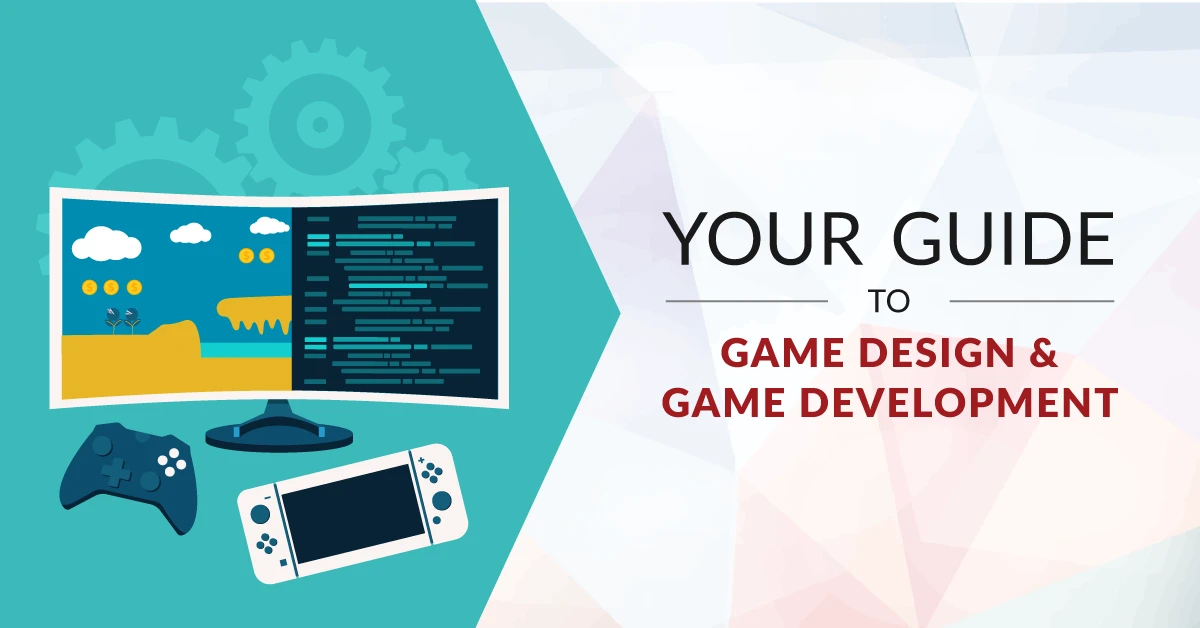
Are you an avid gamer? Have you always imagined creating intricate storylines in your own video game world? Do you love it so much that you want to make a career out of it? Well, you can!
The global video game industry is a billion-dollar business and Malaysia is a major outsourcing player in the Southeast Asia region, with local game studios providing outsourced development for large international gaming publishers. Increasingly, local studios are also starting to build a reputation for creating original games too.
So if you’ve always dreamt of working in the gaming industry (and honestly, who doesn’t?), this is one guide you don’t want to skip. We’ll cover everything from what you’ll learn in a game design and development course and its entry requirements to career prospects and top universities for game design and game development. Keep on reading for more insights.

Asia Pacific University of Technology & Innovation (APU)
BSc (Hons) in Computer Games Development
✓Dual-award degree – one from De Montfort University (UK) and one from APU
#1. What is Game Design and Game Development?
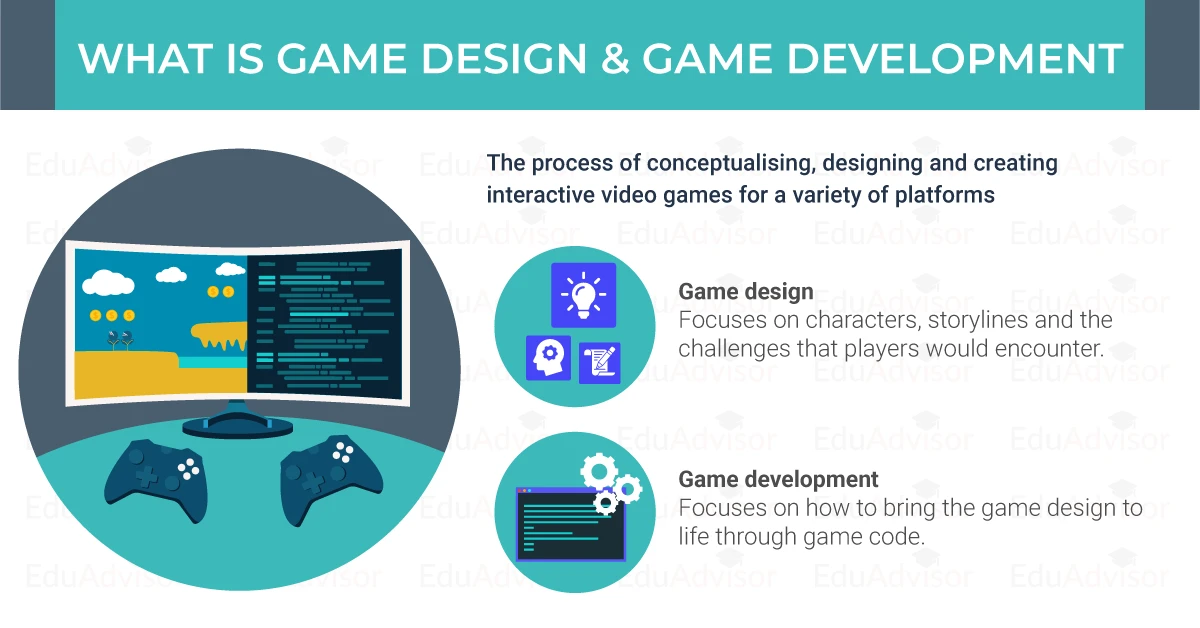
Game design and development is about the process of conceptualising, designing and creating interactive video games for a variety of platforms, from consoles and PCs to smartphones and VR/AR (virtual reality/augmented reality) headsets. It is a multidisciplinary field that combines art and creative design, storytelling, programming and psychology to create an enjoyable gaming experience.
It is important to note that while game design and game development are interrelated and crucial to the creation of any video game, they both focus on different areas. Game design focuses on characters, storylines and the challenges that players would encounter. Game development, on the other hand, looks at how to bring the game design to life through game code.
Both game designers and game developers work closely together to develop engaging gameplay, captivating narratives and visually appealing graphics to create a successful video game.
Game Design, Game Development and Game Art: What’s the Difference?
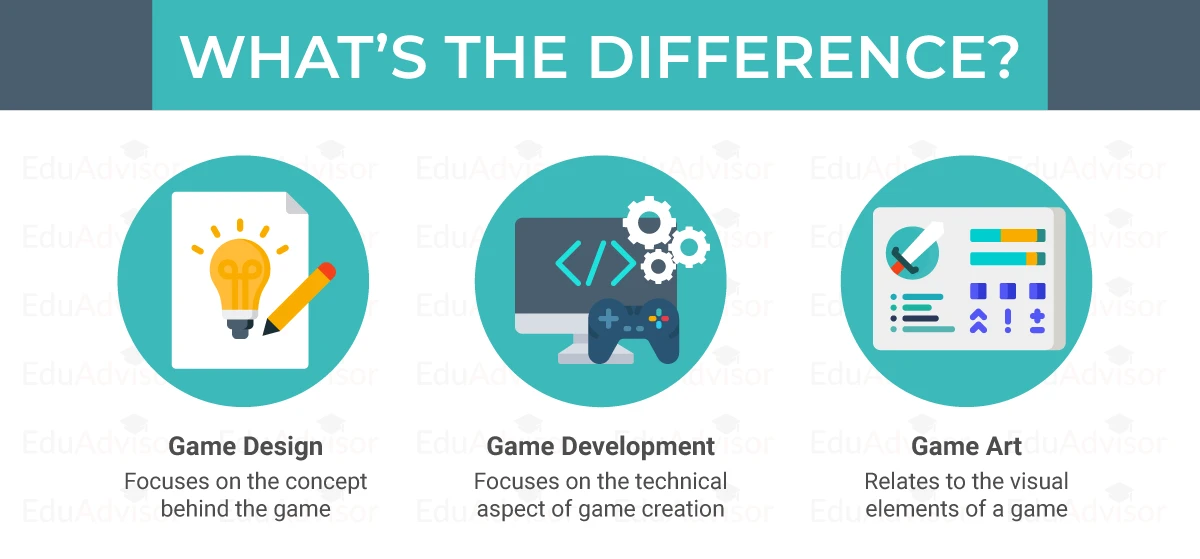 In general, there are three core aspects of video game creation — game design, game development (or sometimes known as game technology) and game art. Each one is fundamental in game creation and focuses on a different aspect.
In general, there are three core aspects of video game creation — game design, game development (or sometimes known as game technology) and game art. Each one is fundamental in game creation and focuses on a different aspect.
a) Game Design
Game design focuses on the concept behind the game. It’s about creating the rules, mechanics, levels and structures that will shape gameplay.
Game designers determine how the game will work, what players will do, the challenges they will have to face, the rewards they receive and the overall player experience. They script out stories and narratives, create character backgrounds and imagine the game world. As a result, they are responsible for coming up with design documents, storyboards and flowcharts of the game concept to help game developers and game artists understand what they are trying to achieve.
As a field of study, universities generally offer game design under the creative or design faculties.

b) Game Development
Game development (or game technology) focuses on the technical aspect of game creation. It looks at how to bring the design of the game to life through programming and coding.
Game developers work to implement game mechanics, physics, character behaviours, and AI for non-playable characters. Through game code, algorithms, and various game engines and tools, they work closely with game designers to ensure that the game functions as intended.
At universities, game development is often under the umbrella of computing.
c) Game Art
Game art relates to the visual elements of a game such as character models, environment textures, visual effects and UI (user interface).
Game artists collaborate with game designers and developers to create concept art, 2D and 3D character models, textures, environments, and animations, ensuring that the game’s art style and aesthetic fit the mechanics and storyline.
Game art courses are usually offered by universities under the art and design faculty.

Asia Pacific University of Technology & Innovation (APU)
APU Foundation Programme (Computing & Technology)
✓Programme emphasises on 4 key areas to ensure your success – leadership and teamwork, problem-solving skills, social skills and responsibilities, and practical skills
#2. Entry Requirements for Game Design and Game Development
a) Subjects required
A game design and game development programme typically doesn’t require that you take a specific subject at the SPM level. However, these subjects are recommended:
- Mathematics
- Additional Mathematics
- 1 Science subject
b) Requirements for Diploma in Game Design and Development
These are the general entry requirements for a Diploma in Game Design and Game Development:
- SPM (or equivalent): Minimum 3Cs including Mathematics
c) Requirements for Degree in Game Design and Game Development
At the pre-university or foundation qualification level, the entry requirements for both Degree in Game Design and Degree in Game Development are similar:
- A Level: Minimum 2Ds
- STPM: Minimum 2Cs
- Foundation in Arts or Foundation in Science: Minimum CGPA of 2.00
- Relevant Diploma: Minimum CGPA of 2.50
However, you will also need to meet the entry requirements at SPM, IGCSE or equivalent, which is where the requirements differ.
For game design, you generally only need a pass in Mathematics. On the other hand, for game development, some universities require you to have at least a credit in Mathematics, with some asking for a credit in Additional Mathematics.
Take Note:
Depending on the specifics of the degree and the institutions that are offering it, the entry requirements may differ. Make sure you check the details carefully.
#3. Studying a Game Design and Game Development Course
a) What subjects will you study in game design and game development?
As a field of study, game design and game development will consist of different specialisation modules due to the different areas of focus. Depending on the university, both will generally cover all the fundamental areas of game creation. The degree will also often include several game projects as well as industrial placements or internships.
Game Design
A Degree in Game Design will have you delve into the intricacies of game mechanics, narrative design and storytelling. Key specialisation modules may include:
- Game Development Life Cycle
- Game Level Design
- Game World Creation
- Game Design Documentation
Game Development / Game Technology
As part of your game development (or game technology) studies, you will focus on the tools and technicalities of bringing a game to life through programming and scripting. Some of the modules that you may study are:
- Fundamentals of Programming
- Game Engine Architecture
- Game Programming
- Mathematics and Logic for Games
Note that the modules may differ from one university to another. It's crucial to review the curriculum of the university that you’re interested in to ensure it aligns with your career aspirations and personal interests.
b) How long is a game design and game development course?
Both diplomas in game design and game development are approximately 2.5 years long. Meanwhile, a degree will often take 3 years to complete.
c) How much does it cost to study game design and game development in Malaysia?
The estimated fees for pursuing a Diploma in Game Design range from RM27,000 to RM109,000, while the estimated cost for a Game Design Degree is around RM48,000 to RM69,000. Additionally, pursuing a Game Development Degree can cost between RM47,000 to RM98,000.

#4. Your Education Pathway for Game Design and Development
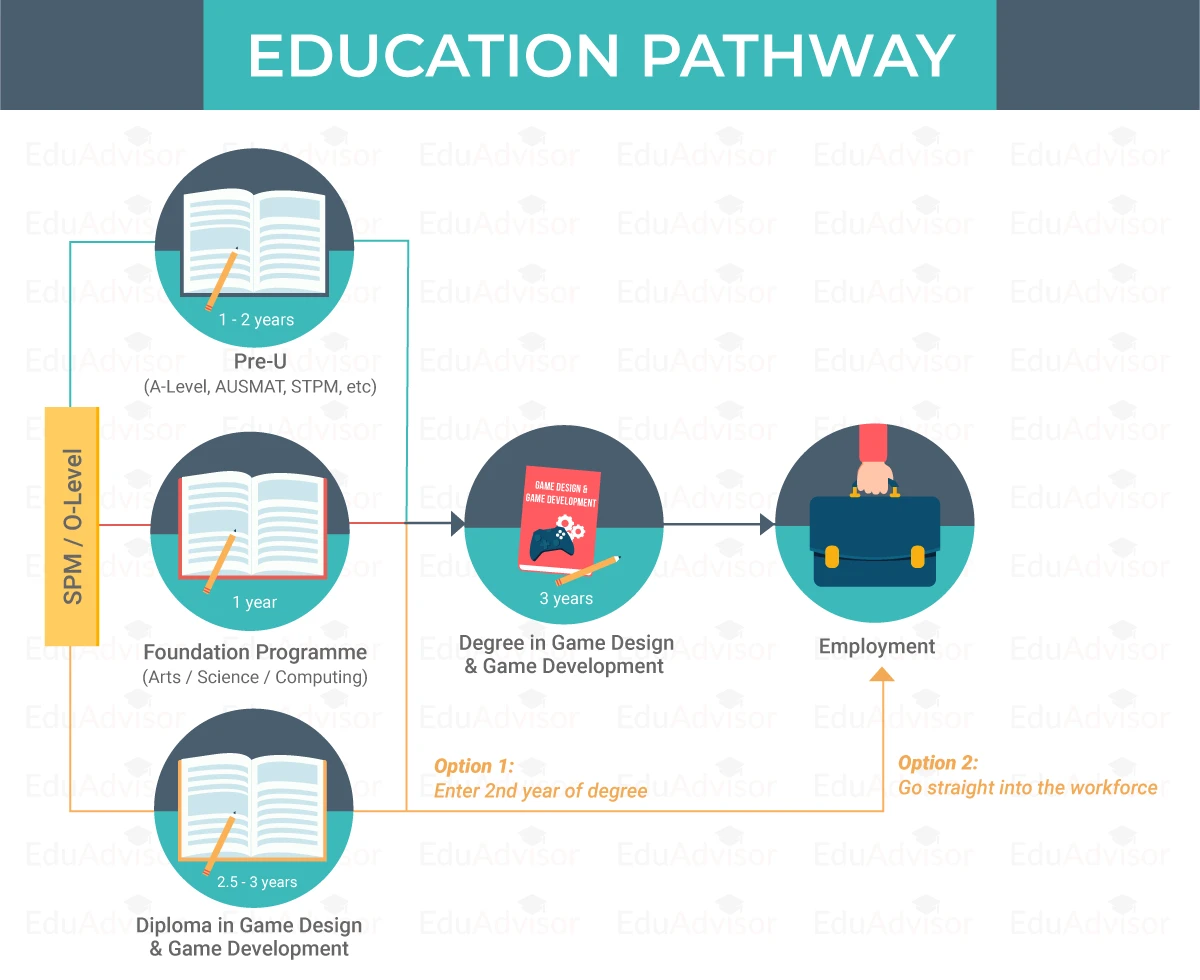
The pathway to a career in game design and development is pretty straightforward.
Upon the completion of your SPM or equivalent qualification, you can opt to enrol into a pre-university (STPM, A Level, etc.), Foundation in Arts, Foundation in Computing or Foundation in Science programme.
Alternatively, you can also choose to pursue a Diploma relevant to the field. Choosing the diploma route will allow you to immediately pursue a career in the field.
Completing a pre-university or a foundation programme will enable you to proceed to a Game Design or Game Development Degree. If you choose the diploma pathway, you can bypass the first year and immediately start your degree in the second year.
Take Note:
In some universities, game development may be offered as a specialisation under the information technology or computer science programme.
#5. Should You Study Game Design and Game Development?
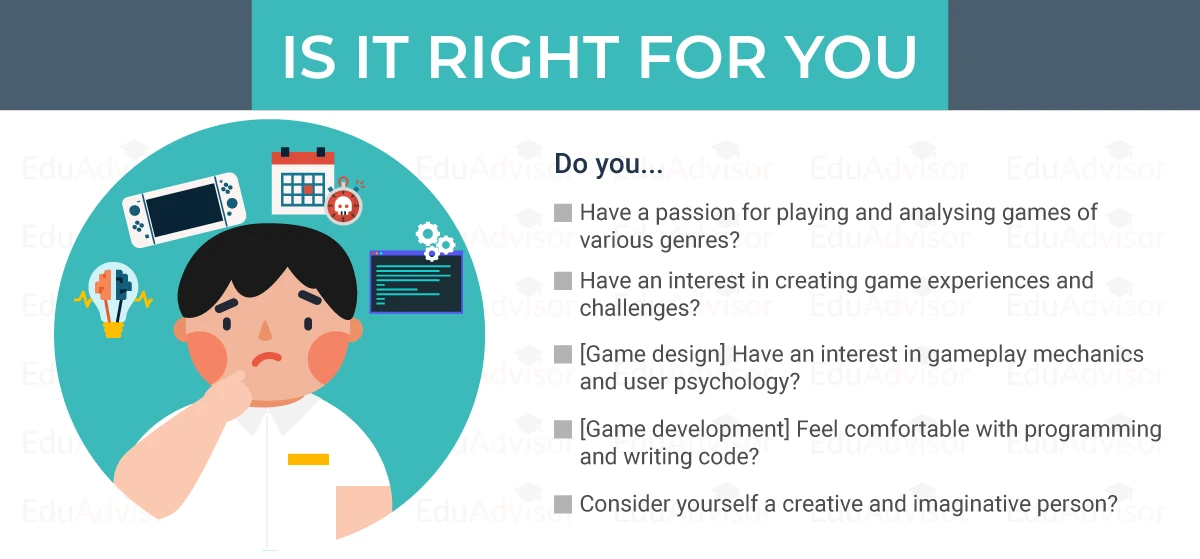
a) Is game design and game development right for you?
If you’re wondering whether you should study game design and game development, here are some questions to think about:
- Are you passionate about playing and analysing games of various genres?
- Do you have an interest in creating game experiences and challenges?
- For game design, do you have an interest in gameplay mechanics and user psychology?
- For game development, are you comfortable with programming and writing code?
- Do you consider yourself a creative and imaginative person?
- Do you work well under pressure?
If you answered yes to most of these questions, then game design and development may be right for you!

Asia Pacific University of Technology & Innovation (APU)
BSc (Hons) in Computer Games Development
✓Dual-award degree – one from De Montfort University (UK) and one from APU
b) Skills required to be a game designer and game developer
Here are some key skills a good game developer should have:
- Creative and innovative thinking
- Complex problem-solving skills
- Attention to detail
- Storytelling and narrative skills (for game design)
- Programming skills (for game development)
- Team player
- Able to work well under pressure

#6. Job Options With Game Design and Game Development
The gaming industry offers a wide array of careers for those who are passionate about creating gaming experiences.
Game design and game development graduates can look to game studios, animation studios, post-production houses and e-sports companies for job opportunities, as well as educational companies, marketing and advertising agencies, and tech companies.
As a game design graduate, some of the careers you can pursue are:
- Level designer
- Narrative designer
- System designer
- UI/UX designer
- Game quality assurance tester
Meanwhile, with a qualification in game development, you can look forward to jobs such as:
- Graphics programmer
- AI programmer
- Game engine programmer
- Game tools programmer
- Gameplay programmer
- Game quality assurance tester
#7. Best Universities for Game Design and Game Development in Malaysia
Interested in pursuing an education in game design and development? Check out some of the best universities offering the programme here.
Asia Pacific University of Technology & Innovation (APU)
Bukit Jalil, Kuala Lumpur
BSc (Hons) in Computer Games Development
Intake
Mar, Jul, Sep
Tuition Fees
RM102,200
Get RM500 Waiver + RM300 Rebate when you enrol through EduAdvisor! T&C apply.







